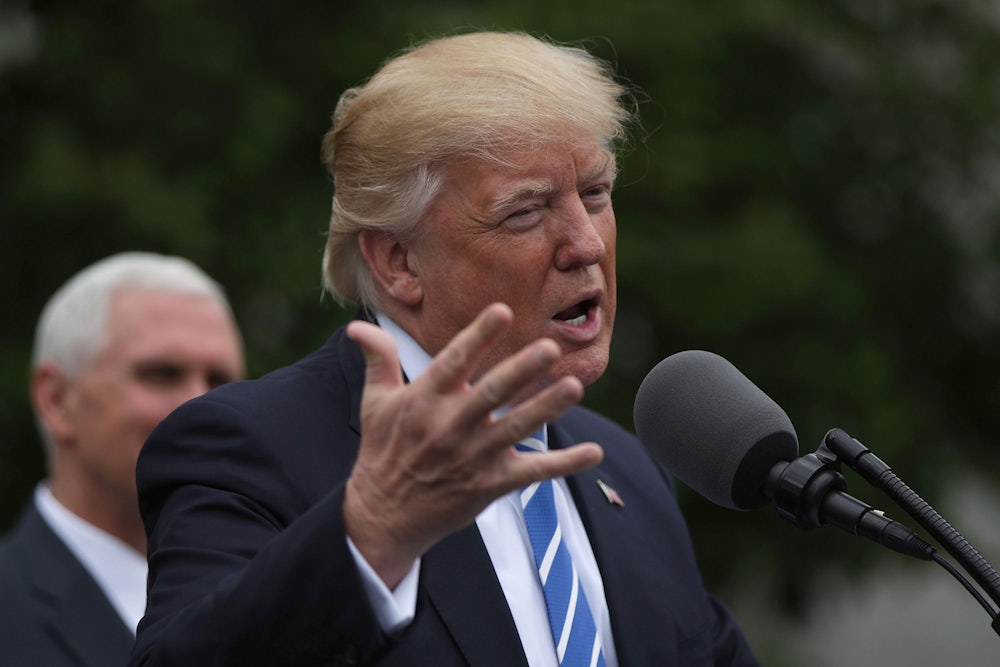Donald Trump has made some puzzling remarks lately about American history, but they can be explained by two harsh truths about the president: He’s learning much that is new to him, and has a narcissistic habit of imputing his own ignorance on everyone else.
“People don’t realize, you know, the Civil War, if you think about it, why?” Trump asked in an interview with Sirius XM radio. “People don’t ask that question, but why was there a Civil War?” While these remarks sound less coherent than the inebriated ramblings found on Comedy Central’s Drunk History, they are best understood by realizing that the question of why the Civil War started, although taken up for more than a 150 years in countless books, is something Trump himself has only started thinking about recently, perhaps under the sway of the informal history tutorials provided by his chief strategist, Steve Bannon.
Trump’s status as a novice student of history is also evident in his Black History Month remarks that “Frederick Douglass is an example of somebody who’s done an amazing job and is getting recognized more and more, I notice.” What Trump surely means is that Douglass, long dead, is someone that Trump himself is starting to recognize for the first time. Precisely because Douglass is new to him, Trump naturally adopts the present tense, even though the great abolitionist leader is long dead. When Trump said that “most people” didn’t realize that Abraham Lincoln was a Republican, he was again speaking more about himself than the general population.
What CNN describes as “Trump’s wacky history lessons” are in fact a fascinating window into his mind because these are remarks about topics he is unfamiliar with, so he speaks about them in an unguarded way, almost with a childlike innocence. As such, they tell us more about Trump’s mental reasoning than his now-familiar political sales pitches, the talking points he repeats by rote.
Trump’s full remarks on President Andrew Jackson are very suggestive about Trump’s worldview:
I mean had Andrew Jackson been a little later you wouldn’t have had the Civil War. He was a very tough person, but he had a big heart. He was really angry that he saw what was happening with regard to the Civil War, he said, “There’s no reason for this.” People don’t realize, you know, the Civil War, if you think about it, why? People don’t ask that question, but why was there a Civil War? Why could that one not have been worked out?
He followed this up by tweeting on Monday night:
President Andrew Jackson, who died 16 years before the Civil War started, saw it coming and was angry. Would never have let it happen!
— Donald J. Trump (@realDonaldTrump) May 2, 2017
Trump adheres to an extremely crude version of the Great Man theory, which posits that exceptional figures are born to lead during key moments in history. This can be seen not only in Trump’s admiration for Jackson, but also his frequent allusions to military generals like John Pershing, George Patton, and Douglas MacArthur. Trump often attributes to these men almost superhuman powers of leadership, as in a false story Trump is fond of telling that Pershing defeated a Muslim insurgency in the Philippines by dipping bullets in pig blood. This admiration for strong men is in keeping with Trump’s disturbing authoritarian tendencies, including his habit of praising autocrats like Filipino President Rodrigo Duterte and Russian President Vladimir Putin.
To be sure, Trump is not alone in adhering to the Great Man theory. After all, biographies are the most pervasive form of popular history. But when Barack Obama read Doris Kearns Goodwin’s Team of Rivals, the lesson he learned was about organizing a strong cabinet, not being a strong man. And when Hillary Clinton evoked the musical Hamilton, it was in the service of praising the ideal of an engaged citizenry. In other words, what sets Trump apart is not that he has historical heroes, but that he admires heroes who are “tough” and push people around, whether it be Jackson in the nullification crisis or various generals in running the military. Patton and MacArthur were the most authoritarian of American military leaders, known for bullying their troops and disobeying the rules.
Because Trump’s schooling in history seems to be coming from Bannon, the president is unexpectedly accurate in the political pantheon he has created. Jackson, who both fought the banks and pursued genocidal policies against Native Americans, is a fitting embodiment of Trump’s white nationalist populism. As Georgetown historian Michael Kazin noted in his 1995 book The Populist Persuasion, nineteenth century Americans who wanted a more anti-elitist politics created a national narrative with “a trio of populist heroes”: Jefferson, Jackson, and Lincoln. While Trump has little to say about Jefferson, he certainly evokes Jackson and Lincoln in that manner. And he gives this tradition an authoritarian twist by celebrating military leaders like Pershing, Patton, and MacArthur.
Trump’s historical ignorance is vast, but he’s cobbled together enough knowledge to suit his political purposes. In his often inchoate and muddled remarks about the past, he’s managed to craft a national story that fits his agenda. Of course, by aligning himself with these supposedly great men of history, he’s implicitly advancing himself as the next great man in American history. As he said at the Republican National Convention last year, “I alone can fix it.” There’s no doubt that he believes this—and no doubt that he’s too ignorant to realize how deeply wrong he is.
